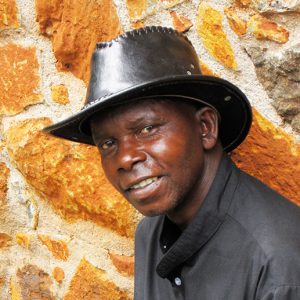Introduction
One of the greatest living mbira players, Leonard Chiyanike comes from an mbira-playing family, and has played Shona mbira music in traditional ceremonies since he was a boy in the 1960’s. Though a humble, easygoing man, his performances on the mbira are outstanding in both their technical proficiency and improvisational style. The warmth of his voice adds to the musical experience. Chiyanike is also one of the most respected Zimbabwean mbira instrument makers. He has enjoyed teaching numerous foreign mbira students in Zimbabwe, and sharing his music and traditional culture during his first U.S. tour in 2012.
Buy a Leonard Chiyanike mbira on this website, see him at work making mbiras.
Recordings Available From MBIRA
Listen to samples of Leonard Chiyanike’s many albums.
Videos
‘Mahororo’ – Leonard Chiyanike with brother Josiah Tarwireyi and granddaughter in 2010
Biography
(written by Denver Banda based on a 2009 interview, edited by Erica Azim)
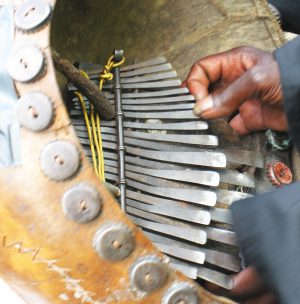
Learning to Play Mbira
The Chiyanike family is originally from Chihota, a rural area long noted for its mbira traditions. Though the family moved around the country, they did not lose their mbira tradition. Leonard’s grandfather, Nhira Chiyanike, played the njari type of mbira, and father Tinaapi played mbira “dzavadzimu”. Elder brother Josiah learned to play mbira from Tinaapi during breaks, while working together as builders, and then Josiah taught Leonard.
In 1964, Leonard was a boy of eleven roaming the mining compound of Mhangura. The teacher in Leonard’s class did not want anything to do with mbira or traditional religion.
“The teacher was a devout Christian who made us hold prayers everyday, was even more strict about Sunday school, and made us know hymns and verses by heart. If he found you doing things the traditional way, you got a beating. I was very scared of this and I adhered to what he prescribed, but my brother had other ideas…”
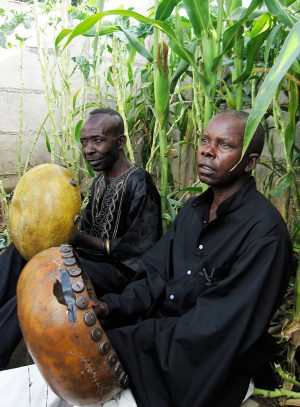
Josiah was six years Leonard’s senior and, because their father was so busy, took on many paternal responsibilities. The beliefs of his teacher and Josiah were two opposite poles; so, when Leonard heard that his brother wanted to teach him mbira, he knew there would be problems. However, Leonard feared his brother more than he feared his teacher and father. Leonard remembers his first mbira lessons vividly.
“Josiah first took a bamboo cane and placed it within easy reach. Next he told me to sit on his lap and started demonstrating what I was supposed to do on the single gwariva (mbira instrument) the family had. He made it clear that if I failed to hit the keys as he was doing, I was to be beaten. Knowing him as a man of his word, I followed his hand over the instrument and at the same time memorizing the sound of each key. I slowed everything down so that copying would be easy. I can say I was more or less forced to learn, and my fear of the ever-present cane kept me alert and completely focused. At first I cried a lot, but I was never hit. When Josiah realized that I had learned it all, he unceremoniously dismissed me. Kariga mombe was the first song he taught me, and after two days I was playing it without hesitant breaks.”
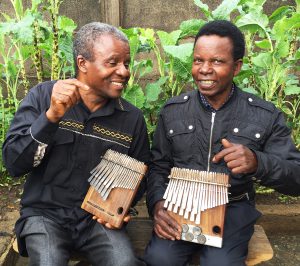
The days following the learning of Kariga mombe saw Leonard gravitate toward the instrument without his brother’s threat to use the cane. Since it was a family matter, the school authorities never knew. Leonard believes that his love for the mbira sneaked up on him, because at first the instrument reminded him of his brother and the associated fear. The love for the mbira began to grow as he began to pay more attention to his father and brother when they played. As his love of mbira grew, Leonard’s playing surpassed his brother’s.
During the time his family lived in Dewedzo, Chiyanike played mbira with the younger members of the Mujuru family (Ephat, Sam, Fradreck and others), whose elders played mbira at the Mujuru village, also called Dambatsoko. Because his father was mbira partners with Musekiwa Mujuru during this period, Leonard became mbira partners, and lifelong close friends, with Musekiwa’s son, Fradreck Mujuru.
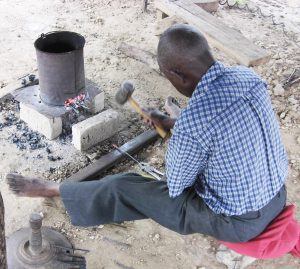
In Chihota during the holidays, Chiyanike encountered ceremonies within and around the extended family’s village, which were all learning experiences for him.
At school, it was always scary for Leonard and his peers to talk about what they did at home. They attended traditional ceremonies with their parents, and this was an undeniably important part of life. Chiyanike says that these ceremonies made him understand and love the mbira.
After three years of intense study with his brother and other mbira players, Leonard played at a ceremony at the Dambatsoko banya (special large hut for ceremonies), an important milestone for him. Recognition of the Chiyanike brothers spread fast, and their parents felt honored to have two sons who could play mbira so well. Josiah later became the medium of grandfather Nhira’s spirit, and the family held a ceremony to welcome the spirit into the home. For Leonard, it was a major highlight as an mbira player and young brother to Josiah. Learning mbira was an interesting experience for Leonard. The core of his mbira style was determined by the way he learned from his brother.
“When Josiah taught me new renditions, he usually played continuously and I would follow the way he way playing. If I missed a key he would correct me by playing the song continuously. I developed a keen sense of hearing and reorganizing everything mentally; I think I still had a hangover from the days of the cane. When Josiah left for work in 1969, I learnt from various other gwenyambiras (professional mbira players) using the same technique. Josiah stayed and played mbira in the then Salisbury (now Harare) with Ephat Mujuru.”
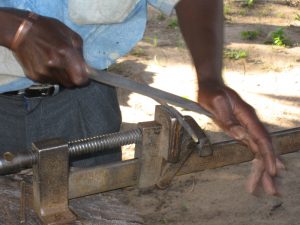
Making Mbiras
Leonard’s other older brother, Joel, did not know how to play mbira, but was an excellent instrument maker. Joel would spend hours on end at homes of mbira smiths, helping out and learning the trade. In 1974, he made his first gwariva (mbira instrument), which Leonard used for many years. That first mbira was a collaborative effort, in that Joel made the whole instrument, and then Leonard went on to tune the arranged keys by playing the songs he knew and adjusting the keys’ voices to agree with how he knew each song’s melody. When the song sounded exactly as it sounded on an old well-tuned gwariva, Leonard knew that he had succeeded in tuning the mbira.
In 1975, Leonard was not satisfied with the mbira that Joel had made for him, because some of the keys kept falling off and getting out of tune. He decided to make his own instrument and give the old one to his younger brother. When his relatives realized that Leonard’s instrument was of a better quality than theirs, they began to have him make instruments for them. After he painstakingly made his father a new mbira, his dad told others about his mbira-making abilities. As word spread, Chiyanike began to have a trickle of customers. Leonard chuckles when he remembers the formative years of his trade,
“I used to make less than six instruments in a year, mainly because there were other commitments. Also, the payment for the instruments was erratic, because in most cases the mbiras were for relatives…who usually gave me a live chicken as payment…in most cases, I was not paid at all.”
However, Ephat Mujuru sold a few of Chiyanike’s early instruments in Zimbabwe’s capital, Harare (then Salisbury), including one made in 1975 that Erica Azim plays today, and uses to teach MBIRA workshops. Read a story about Erica discovering that Chiyanike made her mbira.
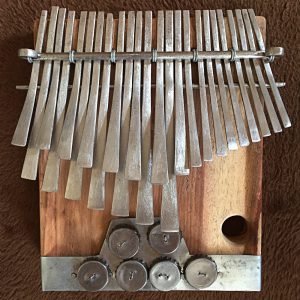
For Leonard Kofesi Chiyanike says a good instrument is born when the mubvamaropa tree that he is using for the gwariva (board) is a 100% dry. He considers a dry gwariva just as important as a sound foundation for a new house. He believes that if the wood is not dry, the mbira will either crack, or the keys will fall out when it shrinks. He observes that wood that is not dry does not shape well under the chisel, does not have a good ringing sound when the keys are mounted on it, and it makes a bad instrument in the long run. In this respect, Chiyanike values patience when making the gwarivas, since it takes a number of months, or even years, for the wood to be totally dry.
The second thing that he looks at when making an instrument are the keys, which Chiyanike says must be even when one forges them.
“If they are forged well and properly aligned, I need not worry about the sound because of the uniformity of how I forge them. There are a few variables in the way I forge them, and I guard against making keys too thick or too thin because, if that happens, the key will sound as if it is choked or muffled when one strikes it. It’s a delicate process that I have mastered over the years.”
The final thing that Chiyanike prioritizes when making instruments is the way he mounts and tensions them on the soundboard. Instead of using chain adjusters/bolts, he prefers steel wire, because it settles into the dry wood, unlike the bolts which can move if the instrument is dropped or it is resting on them…resulting in a need for adjustments that will loosen the bolts over time. Leonard says that wire stays in place well once it is well-mounted and tensioned across the bridge.
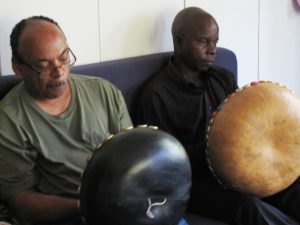
Leonard Chiyanike uses hot-forged steel wire for his mbira keys. He prefers to hot forge so he can use strong steel, and says that softer steel keys that are cold forged usually crack. He guards against overheating the steel wire, saying that if that happens, the key will have a dead sound…and not be as strong, responsive and bouncy when struck by a powerful mbira player. Chiyanike’s final touches for the keys are filing them smooth, and sandpaper polishing to give a shine of newness.
When MBIRA requested that Chiyanike make instruments for the organization’s mbira students, Chiyanike quit working as a builder during the slow season on his farm, and began to make mbiras full-time.
“I had not known that making mbiras could be this rewarding, because before doing business with MBIRA, I only made mbiras for friends and family, and one or two for referred mbira players. Ever since I started working with Erica, I have noted that this is where I am to apply all my energies, because the returns are clearly visible and I can plan for the future knowing that I have a secure income from the income that I get from mbira-making.”
Over the years Leonard has taught many mbira players how to play, and to make instruments, including neighbors Munashe and Edison Chivese, and Henry Gandidzanwa (all recorded by MBIRA, and MBIRA also sells instruments made by both Chiveses).
Playing Mbira
When playing, Leonard first listens to the other player, before deciding where he fits. If the other player is good at kutsinhira, Leonard prefers playing kushaura – in that way he gets to learn what the other musician is playing, by being guided by the way the kutsinhira mbira leads his own kushaura. After this, Leonard can play kutsinhira exactly the same way as that musician, in the future.
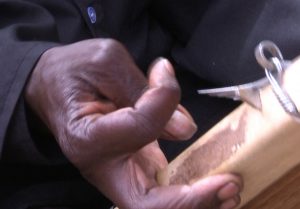 “Some do not know how to pull a song onward and I have learnt to nurture someone’s play toward the best of what they can do. It is relative on different songs and I usually adopt the position that best advances the song. When playing there is a third part that I can get in with if there are two good mbira players.”
“Some do not know how to pull a song onward and I have learnt to nurture someone’s play toward the best of what they can do. It is relative on different songs and I usually adopt the position that best advances the song. When playing there is a third part that I can get in with if there are two good mbira players.”
Chiyanike enjoys singing mahon’era (low pitched singing, mostly vocables) because he says he does not have the voice for the high lines. It is only when he has had a few drinks, that he jumps into singing higher lead melodies.
Nyamaropa, Bukatiende and Nyama musango are the three songs that Leonard loves to play the most. Chiyanike also gives examples of songs he likes that are closely related to Nyamaropa: Mahororo and Kariga mombe.
As a gwenyambira (professional mbira player) who has fulfilled his duty when the spirits come to their mediums, Chiyanike says that when they get possessed, he feels as if he is also possessed because of what will be happening in the banya (large hut for ceremonies).
Chiyanike says that, if the music is played well, it deepens his frame of thought:
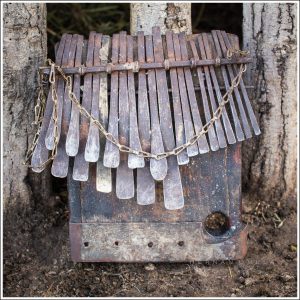
“If one is in the mbira business, he should do it the correct way and be guided by what the instrument is saying. One should not just play for fun, because, in most cases, one may play a song that only appeals to one’s own tastes, yet one should play songs that appeal to everyone’s taste, in the traditional context. It is a great responsibility, one cannot loan out his instruments to other people who might not take care of them, and give them the respect that they deserve. Mbira is for the makombwe and vepasi (spirits) and it is not something you can just play around with. It’s not something that we can just use for trivial entertainment, because it is for matare (consultation with a spirit) and serious traditional rites and rituals. If I am teaching anyone, black or white, I try to teach them that the instrument and music has to be taken good care of, and that when one plays it, they have to play it with a purpose and not just for fun.”
When invited to play mbira at traditional ceremonies, there are a few things that Chiyanike and his playing partners do, before they go out to the venue of the ceremony or gathering.
“We do not move without having received rusumudzo (invitational token of appreciation from the ceremony hosts) because the rusumudzo is what we then offer to our spirits for guidance – it is used to acknowledge their presence and prowess in helping us to play well at the coming event. One has to be spiritually clean before going to play mbira. If you are not, you won’t play well and you may be embarrassed by the svikiros (spirit mediums) as they will point you out.”
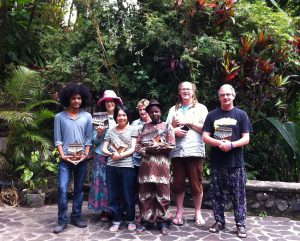
Chiyanike says that there is a much misconception about the context and purpose of mbira, in how it is perceived by Zimbabweans from different religious backgrounds. He sadly notes that that the Zimbabwean Christian community often misleads people, saying that mbira is for demons and evil spirits and that its traditional context is worthless.
“In my extended family, some kin still do not see eye to eye because of the debate on mbira being for the ancestral spirit world, and others saying that its for evil. Some are adamant saying that the living should not follow this heathen way of worship but the surprising thing is that we find them turning to their tradition if something happens to them”
With a look of melancholy, Leonard explains the new trend of mbira playing as one that makes people jovial only, without attaching the relevant spiritual importance to the music that is supposed to be there. He contends that the lack of seriousness in according the mbira respect has led a lot of good mbira players to deviate from what is acceptable to the ancestors. In deviating, they in turn lose touch with that which is supposed to protect and guide them. He noted that the spirits like to listen to the perfect traditional repertoire and if the basic tenets of the music are not there, the spirits do not come at all.
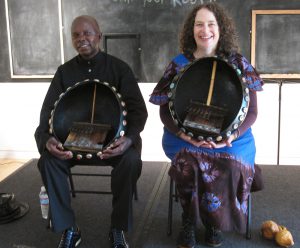
“If we say that we are to play Chipembere, let’s play Chipembere, if it’s Nhema musasa we have to play the right song, and if we are to play Mahororo, we have to play Mahororo. The problem with what is happening now is that there will be three to four songs in one piece and vadzimu (spirits) will not hear us. I do meet some musicians who play contemporary material for fun, yet stick to the traditional material if there is serious work to be done (ceremonies).”
Chiyanike notes that each and every mbira-playing region has a certain style of playing, and they complement their style with a different mbira tuning. However, he is comfortable everywhere he goes, because he can smoothly interchange playing styles from different regions, having lived throughout the country when growing up. “When I meet people from the Rusape area, I can competently play the Dambatsoko mbira and when I get to meet those from the Murehwa area I know that I can play the Kanyuchi with them and when I meet those from Chihota, Mhondoro and Nharira areas, I know that I am comfortable with the Nyamaropa tuning.”
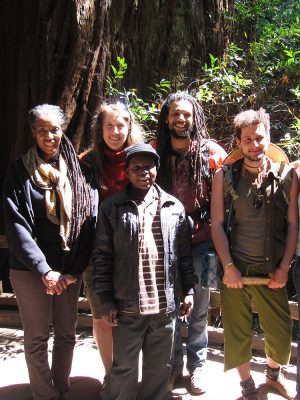
About the Mavembe/Gandanga and the Dongonda tunings, Chiyanike says he knows them from the people of the KoreKore area in northern Zimbabwe, and has learned how to play and make these instruments. He says he accepts them because they are traditionally grounded and have a traditional context.
Success with Mbira
Over the years, Leonard has noted the increasing economic value of mbira making and playing. Since the traditional ceremonies are seasonal, sustenance comes for farming activities that he engages in with his family. When he is not farming, he is busy at his mbira-making work, because MBIRA has helped him sell his instruments to a wider market. The proceeds of mbira sales have greatly improved economic status of his family, and extended family. Mbira making is now Chiyanike’s chief source of income, and he is proud to show off what he has acquired from the mbira sales. For example he gave his village homestead an extreme makeover, including new structures and a paint job. His cattle pen is full of cattle, and his goat pen is bursting with newly purchased goats. (Livestock are the savings account of a rural Zimbabwean, as there are no banks in most rural areas.) Chiyanike’s family are now healthy and well-fed, from the proceeds that he is receiving from mbira sales. He was able to buy an ox-drawn plough for tilling the fields, and has also fenced all his fields to protect his crops from stray animals.
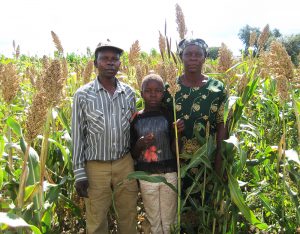
“All the happiness, wealth and dignity that I have as a man comes from the mbira, and I can proudly stand and be counted among other men. I want to tell all those who purchase the instruments that I make to give me feedback, because I want to improve from the comments and criticism. Most importantly, they should play them in the right context and learn the instrument from reputable teacher who has a knowledge of traditional mbira music.”
Chiyanike used the proceeds of his 2012 U.S. tour to buy a truck. He found the new experiences of travel, performing on stages, and meeting and teaching Americans who play his instruments very enjoyable. He taught at MBIRA’s Mbira Camp in Bali, Indonesia in 2014, teaching students who live in New Zealand, Japan, and Bali.
Family
Leonard Chiyanike was born Kofesi Chiyanike on December 20th, 1953, the third of the eight children of father Tinaapi Edison Chiyanike, of the Mhofu Museyamwa clan, and Angina Rupondo, of the Mhofu YeMukono Nyakuzvidzwa clan.
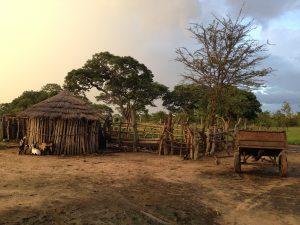 Leonard’s father was a builder who moved the family around Zimbabwe to the various places he found work. Thus, Leonard grew up in various areas of the country, and attended many schools during his childhood, including those in Beatrice, Rusape, Hwedza, Mhangura, Dewedzo, Chihota, and Chipinge. While in Dewedzo, Chiyanike became childhood best friends with Fradreck Mujuru. In his teens, he alternated periods working as a builder with his father and brothers, and periods attending school, but did not have the opportunity to complete secondary school. When he was 14, Kofesi changed his name to Leonard when baptized at the mission school he was attending. From the mid-1970’s through 1983, Leonard worked as a weaver at textile mills.
Leonard’s father was a builder who moved the family around Zimbabwe to the various places he found work. Thus, Leonard grew up in various areas of the country, and attended many schools during his childhood, including those in Beatrice, Rusape, Hwedza, Mhangura, Dewedzo, Chihota, and Chipinge. While in Dewedzo, Chiyanike became childhood best friends with Fradreck Mujuru. In his teens, he alternated periods working as a builder with his father and brothers, and periods attending school, but did not have the opportunity to complete secondary school. When he was 14, Kofesi changed his name to Leonard when baptized at the mission school he was attending. From the mid-1970’s through 1983, Leonard worked as a weaver at textile mills.
At the urging of his father, Leonard applied for a plot of farmland being redistributed by the government, and received one in 1983. Chiyanike has farmed there, in the Ringa area, ever since. During the fallow season, Chiyanike worked as a builder, and later an mbira maker.

Leonard is married to Patricia from the Soko Vhudzijena clan, and they have seven children together. She enjoys the music and is very supportive of her husband’s work and beliefs, as she grew up in the same traditional setting. When they married, Patricia was attending a Pentecostal church that did not tolerate traditional music. She then moved to the Roman Catholic Church, which was more tolerant of Shona beliefs and practices. Then, she stopped going to church altogether after attending a number of ceremonies where her husband was one of the main mbira players.
The Chiyanikes have three boys and four girls. All the sons and one daughter are married. Leonard is currently teaching mbira to his grandchildren.
